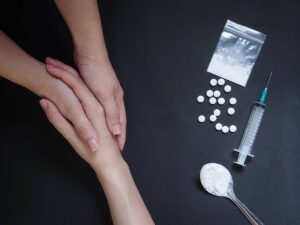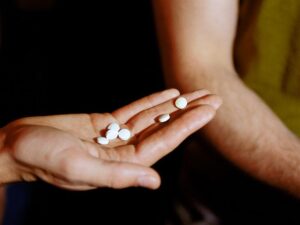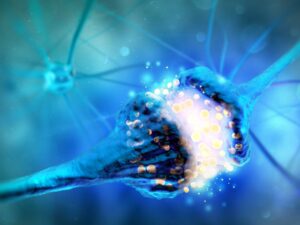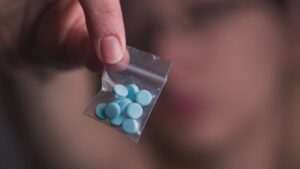 Addiction to any substance doesn’t just happen. It builds up over time, and often the person doesn’t recognize it, and is mostly in denial, until it’s too late and the addiction has completely taken hold.
Addiction to any substance doesn’t just happen. It builds up over time, and often the person doesn’t recognize it, and is mostly in denial, until it’s too late and the addiction has completely taken hold.
Once it’s taken hold, whether that person is aware or not, they can often hold it together. But it’s hard work juggling normality with hiding drugtaking (whether it’s prescription meds, alcohol, or narcotics).
Mostly though people are aware, and they can feel their life starting to head downwards and then spiral out of control.
There are some themes around this. So what I want to do here is talk you through the top 10 signals. If you recognize even two or three of them then you are already on the slippery slope downwards, and if it’s five or more, then you need to stop right now and decide what to do next.
Signal #1: You Are Scrapping Around To Get The Prescription Meds
If you suspect you are on prescription meds that you are addicted to, whether it’s amphetamines like Adderall, opiates like Valium, or something else, then you will spot some signals.
Obviously, if you are just taking prescription meds without prescription for no reason, then you already know you are abusing them and have a problem.
If you start taking them for a health condition, then you may not be aware. But if you are still getting prescriptions even though you sense the problem has gone away or is getting better, or you keep asking for stronger ones, then it could be a problem.
Also, you could start trying to get prescriptions from other sources, or looking in people’s medicine cabinets, or stealing them in some way. You could be looking online to try and buy them from dubious sources.
Signal #2: The Way You Look Is Changing
The way you look will be changing. Obviously, to some degree this will depend on what you are abusing. But, definitely with alcohol, things like crystal meth, most other narcotics, and some prescription meds at high doses, you will start to look different.
You will eat less so you will be thinner. Your skin will look worse. You will not be as physically fit. You will look tired and older than you are.
At the extreme, you will be dramatically different, and with crystal meth you could be mostly unidentifiable after six months of heavy use.
Look at old photos of yourself before you started taking drugs, and take one of yourself now. Be sober and honest when you do this, and look at how you have changed.
Signal #3: You Can Feel Your Pride And Dignity Slipping Away
Everything is now about the drugs, so pride and dignity start to vanish. The quest to get more drugs, to take the more frequently, and to spend more money. Nothing else matters.
You may find you are stealing, lying, putting things off. You could be neglecting your children, partner, family, or close friends.
Nothing else matters much now, and the pride and dignity you used to have are now diminishing fast. Take a look at this, and be honest about your desperation for your next hit.
Signal #4: Your Thoughts Are Consumed With Drugs
During the day, and even at night in bed, most of your thoughts will be about drugs. Whether it’s about needing them, or how and when you’re going to next take them.
It could be about money worries, and where the next lot of money to buy drugs with his coming from.
Or, for alcohol, it could be resisting the temptation to head off to the nearest shop, or panicking late at night about where is going to be open if you run out.
Whatever it is you are addicted to, you will find your thinking starts to predominantly be about the drug and not more normal parts of your life.
Signal #5: Money Is Becoming A Problem (Including Stealing It)
If you are getting addicted to anything then money will start to become a worry for the normal person.
You will struggle to be as efficient at earning it, and could even lose your job. But whatever the situation, you will be spending a higher percentage of your cash on the drug.
So you could notice money becoming a problem. You could notice you are putting off needed purchases, even neglecting your family’s welfare in order to do so.
At the extreme, many people taking drugs steal money. Even if it’s not directly stealing, you could beg someone for a loan that you know you are never going to pay back.
Signal #6: The Things You Loved To Do Are No Longer Interesting To You
Whatever your passions and interests, you will find your interest in them starts to diminish. You are not as passionate about them, and your time spent doing them grows less and less.
This can apply to family and friends as well as hobbies and other activities. So don’t just think about it in one frame, think about things in your entire life you are interested in before you started taking drugs.
Alongside the thinking about drugs all the time, if you are finding you are feeling colder, depressed, disinterested, and only focused on them at the expense of everything you previously love, then that’s a huge warning sign.
Signal #7: Your Drug Life And Your Normal Life Are Blurring
In the beginning you can usually keep drugs and normality separate. As you go in deeper those lines get blurred because you are taking the drugs closer to, and even during those normal times.
Drinking or taking drugs with your family there is a huge warning sign, as is going to work under the influence of drugs. Could be that you can’t function because you are taking drugs and suffering effects late into the previous night.
However it manifests itself, your normality starts to blur with the drug taking. Not only the actual consuming, but thinking about drugs and how to get them, and when to take them, at the expense of every day focus. Sooner or later you will be drug tested at work, and even if you use synthetic urine in order to pass, sooner or later you will be fired
Signal #8: The Risks You Take Are Getting Bigger And Bigger
The risks you take to get drugs and take them will get bigger and bigger. Financially, socially, and personally everything will become riskier.
Risk of losing your job, running out of money, losing your family and friends, it can all take hold slowly until it snowballs out-of-control fast.
You could cheat on your partner, you could leave your children unattended, you could go to some really shady places with shady people and put yourself at risk.
If you are a woman, you could find yourself having sex to get your hands on drugs in return, or worse turning to prostitution.
In the end, no matter how much of an upstanding citizen you are, the risks you take will get so big that they almost don’t matter to you. You risk everything to get the next fix.
Signal #9: The Dose You Are Taking Now Is Far Larger Than The First Dose
The first time you take a substance is often the best. But whatever the case, you need to look at that first dose you took and compare it to what you are regularly taking now.
Usually, you’ll find it’s significantly more, often twice as much, or even higher doses than that. Even if you can’t quantify the exact dose change, look at the amount you spent initially compared to what you are spending now to get the hit.
If the dose is far larger, then it means that you aren’t getting the same dopamine spike and need more of the drug to get it. In addition, your tolerance of the drug will have grown so you also need more of it.
Signal #10: You Are Hiding An Increasingly Larger Part Of Your Life From Those Around You
Generally being shady and subversive is a key signal of drugtaking being out of control.
If you are lying to your family and friends about where you are going or where you have been. If you are dropping out and vanishing for hours and days on end, if you are letting people down just to take the drugs.
It’s also about hiding the finances, the financial burden you are under to keep taking more and more drugs to get the same feelings.
As it progresses, your addiction will mean that you are hiding a huge part of your life, the only part of your life that now matters, from the people around you.
You will know this is happening. You will be routinely lying to people you care about. You will miss appointments; you will avoid situations where you could be confronted or found out.
You will make up stories and lies about where you have been, where you are going, where the money has gone, all to take more drugs. And, you’ll be hiding that life from yourself because you will be lying to yourself about the scope of it as well.





